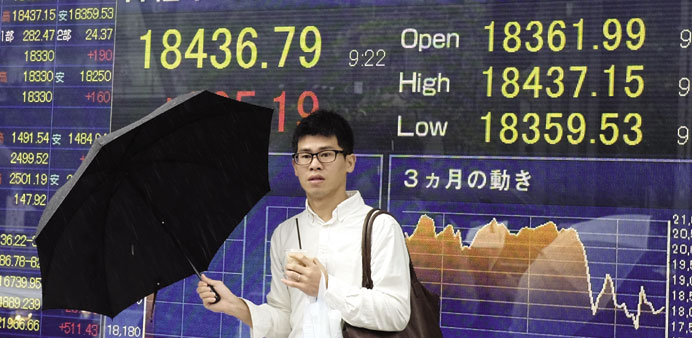A man stands in front of a board showing the numbers on the Nikkei 225 index at the Tokyo Stock Exchange. Japanese shares rose 1.43% yesterday.
AFP/Tokyo
Asian traders remained broadly optimistic leading up to yesterday’s crucial US interest rate decision, with most stock markets and higher risk assets extending recent gains as part of another global rally.
The Federal Reserve’s policy meeting has been the key focus for global investors for weeks as bank policymakers have to weigh a healthy US recovery with a slowdown in overseas economies as well as the recent turmoil unleashed by fears over China.
However, China’s crisis and its government’s ability to control a sharp slowdown in the world’s number two economy continue to drag on sentiment, with Shanghai tumbling again.
“It’s hard to recall an event given so much attention from market players, the implications are far reaching and history provides absolutely no guide,” Chris Weston, chief markets strategist in Melbourne at IG Ltd, said referring to the Fed decision.
An upbeat mood across global exchanges has seen shares rise for most of this week, with US and European dealers enjoying two days of rallies. Yesterday Tokyo ended 1.43% higher while Sydney tacked on almost 1%. Seoul, Wellington and Taipei also ended strongly.
However, Shanghai closed down 2.10% – it surged almost 5% on Wednesday after losing around 6% in the previous two sessions – and Hong Kong finished 0.51% lower in late trade.
Shanghai surged more than 150% in a year before hitting a June 12, since when it has plunged about 40% on fears about high prices and the state of the Chinese economy.
The problem was exacerbated last month when Beijing devalued the yuan currency, raising questions about authorities’ grip on the crisis and roiling world markets – China is the main driver of global growth.
The country’s leaders have tried to reassure investors by buying huge swathes of stocks – leading to recent big jumps – but analysts question are being raised on the limits of the policy’s effectiveness. “The market is becoming increasingly volatile as state support has caused confusion to the market and investors,” said Li Jingyuan, head of securities investment at Shanghai Zhaoyi Asset Management.
“Information on state buying isn’t transparent and it seems that the national team (of state-backed buyers) doesn’t have a clear strategy and tactics.”
While the Fed is expected to lift rates by year end, global markets have moved broadly higher in the past few sessions, with economists predicting the Fed will stand back from moving this month, taking into account the recent strife in equities.
Economists warn a rise now could severely hurt the struggling world economy, and especially damage emerging markets as investors withdraw cash and turn to the US for better and safer returns.
The dollar eased against higher-yielding, or riskier, currencies. The Indonesian rupiah rose 0.15%, the Taiwan dollar gained 0.30%, the Thai baht was up 0.30% and the South Korean won was 0.86% higher.
“Asian markets are doing well today in cautious positioning ahead of the Fed rates decision, with currency moves in particular reflecting the general feeling that rates will be left unchanged,” Angus Nicholson, market analyst at IG in Melbourne, said in a note to clients.
But the greenback edged up to 120.90 yen from 120.61 yen Wednesday in New York while the euro was at 136.95 yen from 136.11 yen on speculation the Bank of Japan will unveil fresh stimulus. Standard & Poor’s on Wednesday downgraded its credit rating on Japan, saying the government had little chance of turning round the economy or weak inflation in the coming years. The move came a day after the central bank stood pat on monetary policy and gave an upbeat outlook on the economy. The asset-buying scheme was a key pillar of Prime Minister Shinzo Abe’s policy drive to kickstart Japan’s moribund economy and conquer deflation.

